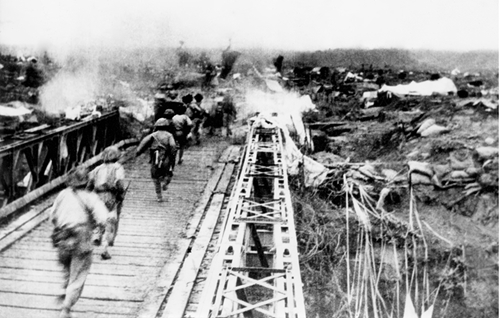General Vo Nguyen Giap, Commander-in-Chief and Commander of the Dien Bien Phu Campaign, used to say that with Dien Bien Phu was a rendezvous that history reserved for wars of aggression in this day and age. Dien Bien Phu Victory was the pinnacle of the victories of the military and people in the long resistance war against the French colonialists, and was a brilliant milestone in the history of the revolutionary cause of the Vietnamese people during the Ho Chi Minh era. It was not only the great victory of the people, but also a common victory for colonial peoples in many parts of the world. Upholding the international solidarity was an important factor in the victory as well as the whole national resistance war against French colonialists. It started with historical events that were meaningful to the theoretical basis of the Party’s revolutionary guidelines, and in action with the strategic vision of President Ho Chi Minh.
    |
 |
|
Our troops crossing Muong Thanh bridge (File photo) |
Nguyen Ai Quoc - President Ho Chi Minh adjusted and developed Lenin’s thesis by promoting the national and international solidarity from the standpoint of the working class: “All workers should unite” during the cause of national liberation. Especially, in 1950, President Ho Chi Minh secretly went to China and the Soviet Union, seeking to develop the Vietnamese revolution, calling for international support for the cause of national resistance war against foreign invaders.
Thanks to the sound decision of President Ho Chi Minh, in 1950, the Soviet Union and China officially recognized and established diplomatic relations with Vietnam. Meanwhile, the socialist countries in Eastern Europe also recognized Vietnam. During resistance wars against foreign invaders, Vietnam became a member of the world’s socialist system, creating a turning point in the development of the Vietnamese revolution.
During the preparation periods for the Dien Bien Phu Campaign, Chinese experts joined hands with Vietnamese people to discuss combat plans, forecast difficulties, and share experience on force building and other major affairs for the cause of national resistance war against foreign invaders and national construction.
At the same time, the Party and President Ho Chi Minh also boosted dissemination work in the international arena, to both expose the crimes of the French colonialists and the righteousness of the Vietnamese resistance war against the French colonialists to protect national independence and sovereignty. It also contributed to the fight for peace and freedom for people around the world.
In France, the French Communist Party issued a resolution condemning the aggressive war in Indochina, protecting French youths, and calling on organizations to fight for peace in Indochina. The French General Confederation of Labor launched a campaign against the aggressive war in Indochina, contributing to supporting the Vietnamese resistance war.
Applying President Ho Chi Minh’s thought, the national resistance war against French colonialists proved that solidarity must be combined with self-reliance, and implemented the motto of “self-reliance and independence.” Solidarity, in combination with independence and self-reliance, must be implemented not only on the Vietnamese side but also on the Party’s policy towards ensuring equality with Laos, Cambodia, and other countries.
Promoting solidarity with Laos and Cambodia as Indochina is a battlefield, implementing international service, promoting resistance wars in the three countries, helping each other, and combining patriotism with proletarian internationalism, among others, are the experiences needed to make the campaign a victory.
Translated by Minh Anh